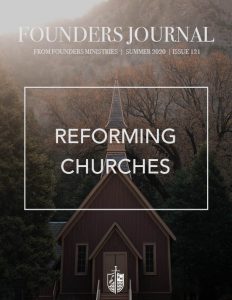This issue of the Founders Journal initiates a look at chapter 26, “Of the Church.” We will cover in detail three of the 15 paragraphs, give a running summary of six others, and parse out the others over the next few issues of the Journal. Other articles that we include, however, are pertinent to this subject in particular and to the overall commitment to give an exposition of a confession of faith.
A summary of paragraphs 1-6 seeks to give a concentrated narrative of how an individual congregation is related to the church invisible and catholic and the reality of corruptions and apostacy in visible congregations and church groups.
We include an article on humility by Baruch Maoz who warns us against any kind of doctrinal hubris arising from our convictions about truth. We affirm that we believe Scripture and accept the confession as an excellent synthesis of some of the important themes of Scripture. But lest we think we have achieved perfect understanding and are beyond further instruction, we should heed the pertinent and experienced admonitions given by Baruch in his reflections on scriptural warnings against foolish confidence. Baruch has been unwaveringly involved in contending earnestly for the faith once delivered to the saints and in working toward a spiritual reform of churches according to full confessional doctrinal purity. In light of the intensity of this stewardship and the need to move a congregation from one doctrinal position to another, it can be a great danger to posture oneself as exhaustively competent and immutably set in doctrinal knowledge. Preachers and theologians who pursue their callings in the context of public proclamation and assertion of truth by means of spoken and written words must look carefully at the warnings of James 1:19 and 3:1,2. Though God has revealed himself as the one true God and has given us an inexhaustible admixture of literary styles in which the web of divine power and wisdom is displayed in a tapestry of propositional truth blending the wonder of creation, the certainty and purpose of providence, the mercy and justice of redemption, and the unwavering clarity of divine knowledge manifest in judgment, we must be careful not to go beyond what is revealed. In fact, we must beware of posturing our ministry in a way that seems to say, “No one can instruct me; I have mastered all the mysteries of revealed truth.” It is true that in every sphere of our lives and even in the reality of our personal existence we can ask, “What do we have that we did not receive?” Baruch’s exposition of humility, arising from careful attention to the Bible as well as years of faithful ministry and caring interaction with fellow Christians, should penetrate our daily call to confession of revealed truth.
Complementary to this urgent and perpetual call for humility, we include an article on the pastoral challenge of church reform. This phenomenon could be seen as humility under fire. The doctrine of the church prompts us to think with grateful submission about the reality that the church belongs to Christ; he builds it, he calls and gives gifts to all its members. He sanctifies it by his Spirit, he determines its professions of truth by his word, and he claims it as his bride, even as his own body. This should give a sobering sense of stewardship to those who are called to be its teachers—those who are called to reprove, rebuke, correct, instruct in sound doctrine with all patience and teaching. The need to be of humble mind and careful in speech does not translate into cowardice or refusal to work with love and patience toward greater holiness and doctrinal knowledge and fidelity in the church. Clarity and courage are needed in shouldering the responsibility of giving an account in the day of judgment for those under our charge. Perhaps such a call should shock us into humble efforts at measuring our stewardship in light of a robust doctrine of the basic principle of regenerate church membership and the position of the church as the “pillar and foundation of the truth” that confesses the “mystery of godliness.” Scott Lee, a pastor in Arnold, Missouri, provides a testimony of how a humble submission to truth, a willingness to suffer unjustly under the assault of malignant accusations, led to reform in his life as a pastor and in the witness of his church. Insights from his diary and the progress of a doctrinally secure but existentially troubled heart brand this account with an authenticity and hopeful spirit from which every lover of Christ’s church can benefit. The challenges that such reform gives to nurturing the combination of love, patience, humility, and truth is shown in living color in this testimony.
Paragraph ten of chapter 26 deals with the work of the pastor and his relationship to the congregation. This relationship is a peculiarly Baptist idea for it is not contained in the Savoy Declaration, the Savoy Platform of Polity, or the Westminster Confession. It speaks of the mutual reciprocal obligations of pastor and congregation including the issue of a proper support for a settled ministry. One who is gifted and called to that all-consuming duty should be able to exert himself to the utmost in pursuit of the distinctive features of pastoral ministry, including the provision of hospitality. David Smith, a seasoned pastor and faithful doctrinal expositor, has produced an excellent exposition of that paragraph. He loves the church, the pastorate, and the charm of human language; his affection for all that comes through in this article. He engages some of the most trustworthy pastors of the past in helping us understand the beauty of this element of the relationship between pastor and people.
The difficult idea of how a local, independent, autonomous congregation can enter into relationships with other churches for the sake of edification and gospel advance without surrendering the duty of self-governance under the Lordship of Christ is treated in paragraphs 14 and 15. The confession emphasizes that to each local church God has given “all that power and authority, which is any way needful, for their carrying on that order in worship, and discipline, which he hath instituted for them to observe” (paragraph 7). Beyond that, moreover, these churches “ought to hold communion amongst themselves for their peace, increase of love, and mutual edification” (paragraph 14). To this necessary, but sometimes delicate, aspect of cooperation between autonomous local churches Tom Hicks gives careful attention. Taking these two paragraphs point by point, he gives a clear exposition, and hearty approval, of the principle of associationalism among Baptist churches. He engages the prooftexts used in the confession and adds helpful discussion from his own expository gifts and relevant experience.
I pray that the reading of this Founders Journal will encourage humility, pastoral conviction and faithfulness, and a biblical spirit of laboring together with other like-minded Christians and churches.























